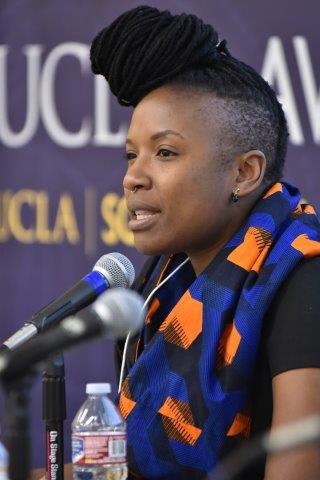Growing up, E. Tendayi Achiume wanted to be a physicist or an engineer, inspired by a high school physics teacher.
“I also considered a career in medicine for a long time,” she says. “But as an undergraduate, I took a college seminar taught by a third-year law student on law and international development, and that seminar completely changed my sense of the work I wanted to do. I decided I was interested in law as a tool for social change and that’s how I ended up on this path,” says Achiume, who is currently an assistant professor at UCLA School of Law.
The law student who taught that seminar, Dr. Bernadette Atuahene, now herself a law professor, undoubtedly had a role in Achiume’s decision to take up law.
While in law school, she developed an interest in refugee issues and human rights abuses against Zimbabwean refugees seeking asylum in South Africa.
“I think my interest in refugees and international migration more generally has only grown since then, in part because my own life has been characterized by voluntary and involuntary international migration,” she says. “In a world that remains firmly statist, and where rights are most strongly administered and protected at the national level, I find refugee and migrant rights issues to be especially pressing and challenging.”
Achiume says that one of the things that she loves about her current job is that, through her scholarship, she can explore the conceptual, theoretical and normative complexity of a world defined by borders. In the advocacy work that she does through the International Human Rights Clinic, her teaching and a United Nations appointment, she can also focus on policy and its impact on real lives.
“When I started teaching the International Human Rights Clinic I made the deliberate decision to make local human rights and social justice issues a central focus of the clinic, in addition to the international projects we work on,” she says. “With our international projects, there is a sharp limit to how nuanced an understanding students can develop of the social and political complexity that frames the legal problems we are tasked with addressing.”
In her local human rights work, she has partnered with a number of community-based organizations, including Dignity and Power Now, a grassroots organization based in Los Angeles that fights for the dignity and power of incarcerated people, their families and communities.
“As is always the case, organizations rooted in communities have the most sophisticated understanding of the problems confronting them and are vital to developing strategies to overcome these problems,” says Achiume, adding that she co-authored a report on medical neglect and abuse against women of color in Los Angeles County jails.
In her role as United Nations special rapporteur on contemporary forms of racism, racial discrimination, xenophobia and related intolerance, Achiume plays a critical role in raising global awareness about the nature and prevalence of different forms of discrimination and intolerance.
“I do so through fact-finding missions, including through official country visits, which culminate in reports documenting my findings that are addressed to the United Nations,” she says. “I can also investigate allegations of racial and xenophobic discrimination on the basis of submissions made by civil society organizations, social movement actors and members of the public more generally.”
Another part of the job, she says, is contributing to the development and enforcement of global frameworks relating to racial discrimination and intolerance.
“Twice a year, I submit thematic reports focusing on a specific issue — once to the United Nations Human Rights Council and once to the United Nations General Assembly,” she says. “The aim of these reports is to highlight how global human rights law and norms apply to problems such as xenophobic discrimination or racial profiling and to make recommendations for best practices states should adopt to combat these problems.”
Finally, she says that her role is to provide a platform for knowledge exchange between different stakeholders — governments, academics, lawyers, activists and survivors of human rights violations — on how best to harness the potential of global human rights frameworks governing racism, xenophobia and related intolerance.
E. Tendayi Achiume
Title: Assistant Professor of Law, University of California, Los Angeles School of Law; UN Special Rapporteur on Contemporary Forms of Racism, Racial Discrimination, Xenophobia and Related Intolerance
Tenured: No
 Dr. E. Tendayi Achiume
Dr. E. Tendayi AchiumeAge: 36
Career mentors: Dr. Asli Bali, University of California, Los Angeles; Dr. Devon Carbado, University of California, Los Angeles; Dr. Jaya Ramji-Nogales, Temple University; Dr. Hiroshi Motomura, University of California, Los Angeles; Dr. Guy Charles, Duke University; Dr. Dorothy Brown, Emory University; Dr. James Gathii, Loyola University Chicago; Dr. Oona Hathaway, Yale University
Words of wisdom/advice for new faculty members: Find community — maintain lines of communication with people within the academy who provide you with intellectual and emotional support because it isn’t possible to do this work alone.



















